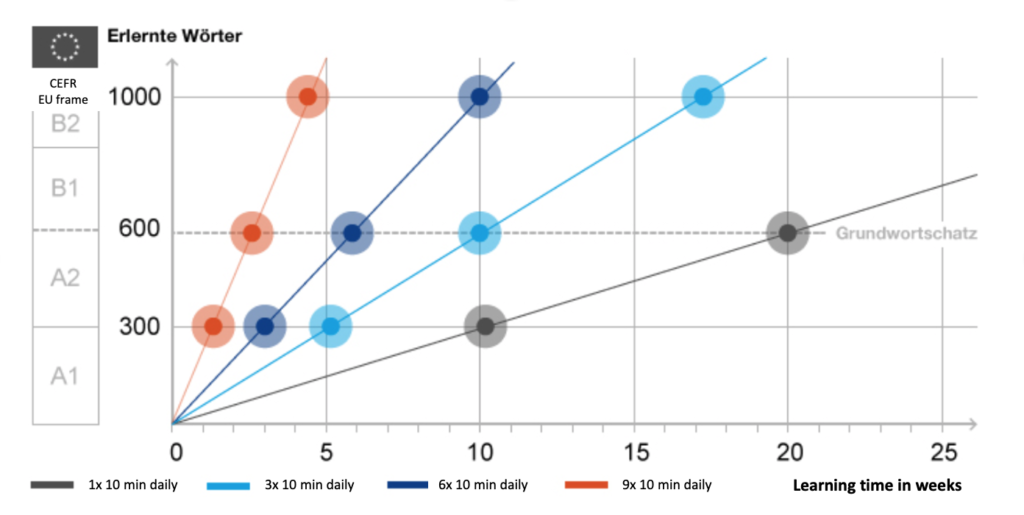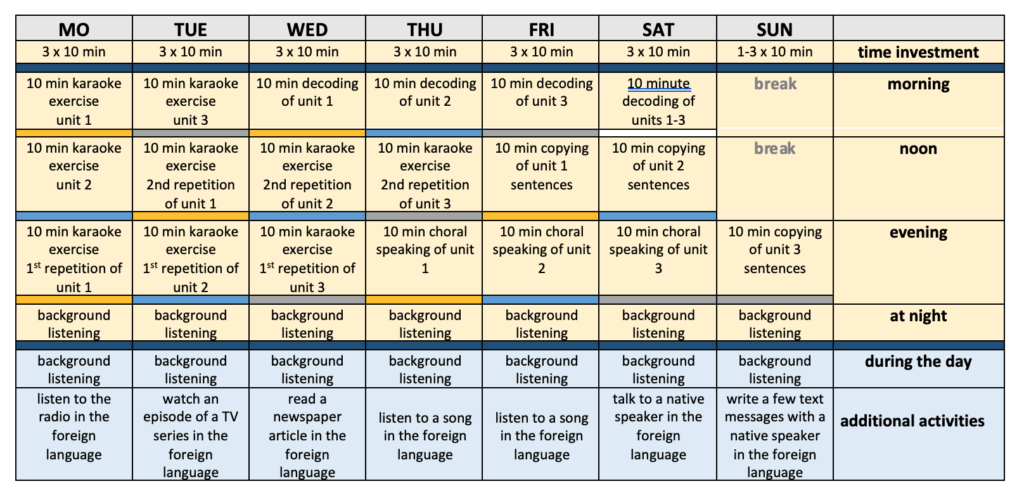Your weekly schedule
You would like to learn a foreign language, have taken a brain-friendly language course, and are full of energy… but how do you start now? And which exercises are essential?
My goals
Before you start learning, it is important to set your goals. Brain-friendly prefers to describe goals in learned words.
So set your target as a vocabulary. Here is a clue:
300 words – so you can easily communicate on vacation and in everyday life.
600 words – so you understand most of the day’s communication. In comparison: A daily newspaper can manage with about 500-600 unique words.
1000 words – 90% of all texts get by with this vocabulary. Only specialized terminology and words from literature are not included in this vocabulary.
Time expenditure and when you reach your goal
Now define the time frame in which you want to reach this goal or how much time you want to spend daily.
Example: Always practice in 10-minute units, which doubles the learning time! If you spend about three times 10 minutes a day, you will reach the goal of 600 words in only ten weeks. With six exercises per day – a total of 1 hour – you will get to your goal in 6 weeks.

Now it is best to create a weekly schedule. This schedule could look something like this:

Three units with 1-3 sentences of a foreign language lesson are provided for this purpose (colored in orange, light blue, and gray). It is best to mark the sentences in the learning program and play them in an endless loop. At the end of the week, you will be able to understand these texts (approx. 9 sentences), speak, write, and use them yourself!
Is this learning plan too full for you?
If so, omit the activities of the 2nd unit (highlighted in light blue). If the weekly schedule is still too full for you, you can also skip another unit. Essential in any case: at least three repetitions!
Repeat each unit at least three times! Because we lose about 40% of what we have learned or heard after only 20 minutes. The more often you repeat, especially at the beginning), the faster the studied material will be stored in the long-term memory.
Deviations from the learning plan: If on some days, you are not able to fulfill your learning plan, then make up for it with more exercises on the following days. Or you need more time to reach your learning goal.
The five exercises:
Exercise No1: Karaoke exercise with the MOVIE© language courses by brain-friendly
Listen to the native speakers and read the word-for-word translation into English. Concentrate only on the bottom line (translation). The word pair (foreign language + German) lights up synchronously with the speaker, similar to a karaoke player. It is best to listen to the text passage in an endless loop.
Through this karaoke exercise, you learn, purely intuitively:
- the meaning of the words (instead of cramming vocabulary) and
- the sentence structure, as well as the use of the words in context (grammar)
Do you already understand a word in a foreign language? Repeat the text passage until you have clicked away at least 85% of the words in your selected text area or lesson. Only then do you move on to the next section or course.
Exercise No2: Background listening serves exclusively for speaking!
This exercise is necessary not only to understand the foreign language but also to speak it yourself. Let the texts (audio files of the MOVIE© courses) run quietly in the background without listening intently. Instead, go about your everyday life – work, sleep, etc.
Your brain builds up the nerve tracts necessary for perfect speech in a foreign language, and you get used to the new sounds, rhythm, and melody of the language. You delegate the learning work to your subconscious, and this does not take any time!

Exercise No3: Decoding (optional)
Decoding means “to decipher.” The foreign language is decoded and discovered so that you can understand the individual parts. And thus, the context of the words can be conceived.
It works that simple: Here is a French sentence translated word for word into English. Already decades ago, Vera F. Birkenbihl drew attention to this learning approach. Today, the decoding is as close as possible to the correct mother tongue.
J’ai été à l’école en Allemagne.
I’have been to the school in Germany.
By decoding the sentences you have previously learned in the karaoke exercise, you consolidate your knowledge and build up a skill. It is also a kind of self-check – what did I actively memorize? With the exercise documents (which are delivered with every brain-friendly course), you consolidate your learned knowledge and develop the foreign language’s writing.
Exercise No4: Choral speaking
As the name suggests, when speaking in a choir, you speak “in the choir” – you and the recording speaker. This is one of the exercises that automatically corrects deviations in your pronunciation by imitating the announcer, thus leading you into “harmony” with the speaker. The subconscious mind checks its own and the spoken language and compensates for differences independently. If perfect pronunciation is your primary goal, you should do this exercise more often.
With the brain-friendly MOVIE© language courses, you can put choral speaking into practice very well. You start the video and read the text aloud. In the beginning, adjust the speaker’s volume so that it is about as loud as you speak. Do this exercise until you notice that you are becoming more confident. After a few repetitions, reset the volume of the computer or smartphone. In time, you will no longer need the speaker.

Exercise No5: Writing
If writing the language is also your goal, we highly recommend this exercise. Like self-decoding and choral speaking, writing consolidates your language skills and serves as a kind of self-examination.
Write the sentences or texts you learned in the karaoke exercise on a piece of paper. This exercise is crucial for languages with other fonts, such as Chinese or Russian, to learn how to write.
Are your skills already advanced? If so, you can try to form sentences yourself or write a short story – preferably around the topic of the karaoke exercises.

The language learning exercises presented here are particularly suitable for the language courses of brain-friendly. However, exercises such as decoding, choral speaking, writing, or background listening are also possible with other learning materials.
